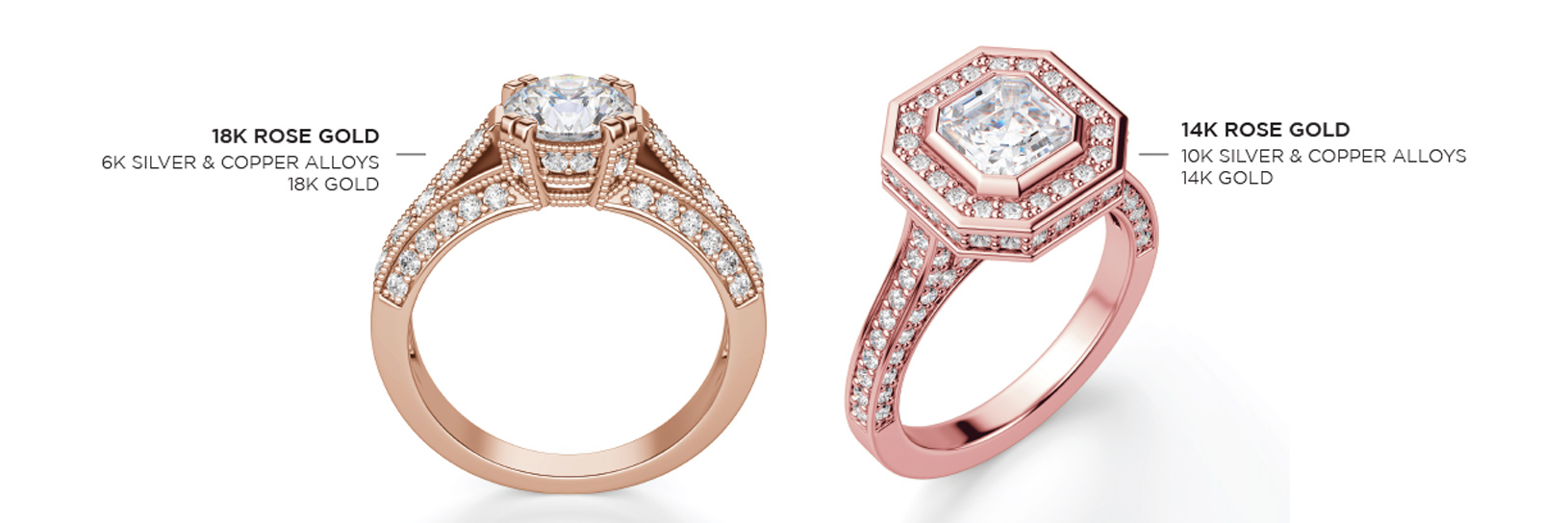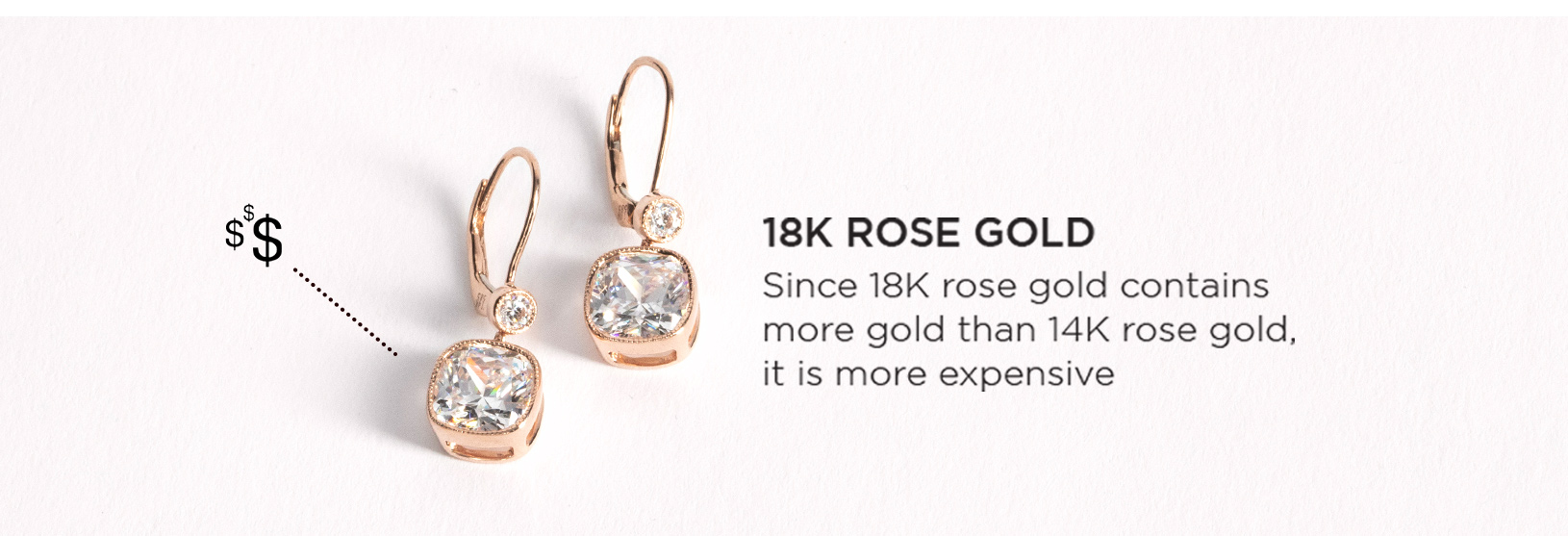14k vs 18k Rose Gold: Which is Better?
November 9th, 2023 / Hetal M

14k vs 18k Rose Gold: Which Is Better?
You are probably familiar with the different types of gold, which are yellow gold, white gold, and rose gold, but are you familiar with the unique compositions of each gold color and their differences? You may have already decided rose gold is the gold for you, but what about 14K rose gold vs. 18K rose gold? Do you know which type is better for rose gold engagement rings?
Between the unique metals, stone shapes and types, setting styles, and price differences, it is difficult enough to decide what you want your simulated diamond engagement ring to look like. So, we do our best to bring you all the information you need to make an educated choice.
Below, we’ll take an in-depth look at rose gold. We’ll discuss the common questions that arise when considering 14K vs 18K rose gold and which one is better for a gold engagement ring.
14K vs. 18K Rose Gold: Composition
To understand the key difference between 14K and 18K rose gold, it’s important to understand how rose gold is made. This precious metal is made from pure solid gold as well as copper and silver. How much of each of these metals is included is what differentiates the two different karat gold weights.

Pure gold is 24 karat gold. Similar to 18K yellow gold and 18K white gold, 18K rose gold is made up of 18 karats of pure gold. The remaining 6 karats, however, are what give the different golds their color. For 18K rose gold, the remaining 6 karats come from mostly copper metal alloys and some silver metal alloys. 14K rose gold, on the other hand, is made up of 14 karats of pure gold, with the remaining 10 karats coming from copper and silver metal alloys.
These 4 karats don’t just affect the composition, though. The difference affects expense, durability, and color as you’ll see below.
14k vs 18k Rose Gold: Cost
The higher the level of gold purity in any jewelry, the more expensive it is because of gold’s incredible value. Since 18K rose gold contains more gold than 14K rose gold, it is more expensive. Of course, the style of the jewelry piece you are purchasing, the designer, and the precious gemstones and diamond pieces included in the design will all play a role in how expensive the piece of fine jewelry or diamond engagement ring is. When all of these factors are the same, the 18K rose gold version will be more expensive than the 14K rose gold version.

If affordability is a top priority for your gold ring, you are already on the right track by choosing rose gold. Rose gold is typically more affordable than other common engagement ring metals such as yellow gold, white gold, or platinum ring. For a more affordable gold engagement ring option, choose 14K rose gold over 18K rose gold.
14K and 18K Rose Gold: Color Difference
Due to the different levels of yellow gold, copper, silver, and sometimes zinc in the rose gold variations, 14K rose gold and 18K rose gold do differ in gold color. Typically, 18K is an alloy metal that is 75% gold and 25% copper and silver. 14K gold is around 58% gold and 42% copper and silver.
- 14K rose gold has a deeper pink color because of greater amounts of copper.
- 18K rose gold has a much lighter pink color.
It’s very interesting to see how the rose gold composition impacts its coloring. This is an important factor to consider when making a decision about 14k vs 18k rose gold.

While the amount of yellow gold in 14K and 18K rose gold remains consistent, not all 14K rose gold will look alike, and not all 18K rose gold will look alike. Rose gold jewelry will vary from a reddish hue to a champagne hue depending on the mix of copper and silver, and sometimes zinc.
Which one is better based on color is completely determined by personal preference. If you prefer a reddish hue or desire a more vintage look, 14K rose gold will suit you better. However, if you prefer a pale pink color, you will likely prefer 18K rose gold. Both variations of rose gold look beautiful on all skin tones and pair well with other metals too. While you can mix 18K rose gold and 14K rose gold jewelry, if you want consistent coloring across all of your jewelry, be sure to shop for one type or the other.
Does 18K or 14K Rose Gold Tarnish?
You are probably wondering does rose gold tarnish? The good news is that rose gold, regardless of whether it is 18K vs 14K gold will not tarnish. Both 18K and 14K rose gold do develop a patina over time, though, which is a slight sheen and color effect that occurs as the copper component oxidizes. This oxidation is a long, slow process, which is why a rose gold ring with such patina is typically antique or vintage. This appearance tends to make rose gold jewelry even more valuable and gives it an irreplaceable essence.

While 18K and 14K rose gold does not tarnish, jewelry plated with rose gold does. Rose gold plating is a thin coating of rose gold on top of another precious metal. Over time, this plating will wear away and tarnish as a result of exposure to air and moisture. The plating will also tarnish unevenly, revealing a patchy appearance and making it difficult to re-plate the jewelry. For these reasons, rose gold plating shouldn’t be considered a sustainable option for an engagement ring or wedding ring.
Is 18K Rose Gold or 14K Rose Gold More Durable?
Gold is a particularly soft metal, which is why it is combined with metal alloys to create a jewelry piece in the first place. Left in its pure, 24-karat form, gold would be far too soft and malleable to withstand the test of time and would bend and scratch easily. Copper, on the other hand, is an extremely durable metal, one of the strongest, in fact. Its addition to pure gold in order to make rose gold makes rose gold much more durable. The more copper and the less gold, the more durable the metal. Additions of silver and zinc, which also are strong metals, contribute to greater durability as well. This is why 14K rose gold is more durable than 18K rose gold.

For a wedding ring, durability is quite important. If you live an active lifestyle or don’t want to worry about everyday wear and tear damaging your ring, you may want to go with 14K rose gold. If, however, you plan to take your ring off whenever you go to the gym or wash the dishes, you may be able to avoid any potential damage to 18K rose gold. In order to keep your ring in tip-top shape, you may want to learn how to clean rose gold. For other rose gold jewelry such as necklaces and earrings, the difference in durability is less important than it is for jewelry worn on your hands that is exposed to more surfaces and materials.
14k vs 18k For An Engagement Ring
Now that we have discussed expense, color, maintenance, and durability, you may have a good idea of whether or not 14K or 18K rose gold is right for your engagement ring. The decision is truly up to you. Your preference in color, your budget, and your lifestyle will all help you decide which rose gold is the one you want for your engagement ring.
That being said, most engagement rings and wedding rings are made with 14K rose gold as it is the more popular of the two. Its deeper rose color, incredible durability, and affordability make it a wonderful choice for an engagement ring.
If you have decided that rose gold is the right material for your ring, browse our selection of rose gold engagement rings, all made with 14K rose gold, to discover the style that is your perfect match.
Sources
https://www.everything-wedding-rings.com/rose-gold-engagement-rings.html
https://www.withclarity.com/blogs/metal/rose-gold-trends
*Here at Diamond Nexus, we strive to provide valuable information while being clear and honest about our products. The Nexus Diamond™ alternative is a patented lab created diamond simulate that, among all simulants, most closely imitates the look, weight and wear of a diamond, with two exceptions – it is absolutely perfect in every way, and it costs significantly less. Price points and environmental facts expressed in this blog were taken from popular online retailers and may vary. Learn more about the environmental impact of mining by visiting our blog.

